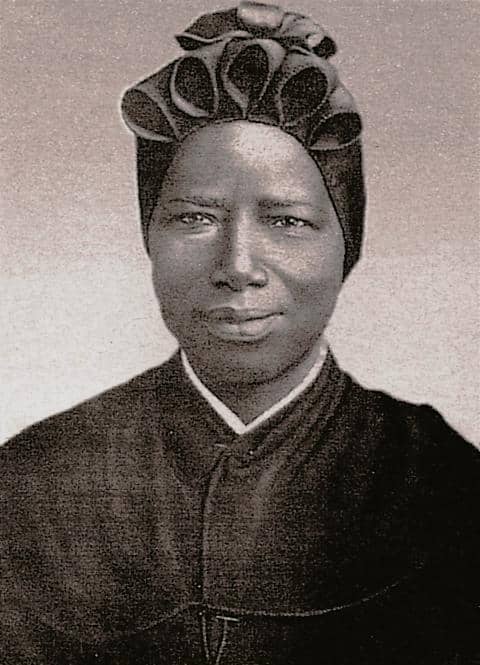YAOUNDÈ, Cameroon – Around the world, Christian women are suffering sexual violence due to their faith.
This year, Aid to the Church in Need is highlighting this issue during its annual Red Wednesday appeal to highlight Christian persecution.
“There are parts of the world where religion still plays a huge role in influencing people’s behavior, both good and bad. And in numerous countries girls and women from minority faith groups find themselves particularly vulnerable to attack,” said Fionn Shiner, the of Aid to the Church in Need UK.
The charity’s Hear Her Cries report, to be released on Nov. 24, will document how Christian women are kidnapped, forced to convert from their religion, and sexually assaulted in countries around the world.
“We want the UN to recognize this aspect of violence against women and then take effective steps to address this. These effective steps could include improving reporting, raising awareness, reviewing laws, and actually ensuring these laws are enforced,” Shiner told Crux.
What follows are excerpts of that interview.
Crux: What message are you sending to the United Nations?
Shiner: There are many Christian women who suffer sexual violence because they are Christian – but we don’t believe the UN quite appreciates this. There are parts of the world where religion still plays a huge role in influencing people’s behavior, both good and bad. And in numerous countries girls and women from minority faith groups find themselves particularly vulnerable to attack. We want the UN to recognize this aspect of violence against women and then take effective steps to address this. These effective steps could include improving reporting, raising awareness, reviewing laws, and actually ensuring these laws are enforced.
In the materials for last year’s International Day for the Elimination of Violence against Women there was no mention of that a woman’s religion can be a reason why she’s targeted for violence. It isn’t a zero-sum game, and we are by no means saying violence against women on grounds of race or sexuality is not important. We are asking for balance and fairness and imploring the UN to do something about the women all over the world who suffer the most gruesome treatment because they are of the “wrong faith.”
How big a problem is the kidnapping and abuse of Christian women around the world and which regions are worst affected?
Our report Hear Her Cries: The kidnapping, forced conversion and sexual victimization of Christian women looks in detail at this problem. Although it is grossly underreported, for a number of reasons, we classify it as a human rights catastrophe. In certain parts of the world, we believe it fulfils the criteria of genocide seeing as jihadists target women with the clear intention of destroying minority faith communities.
Our research suggests that Pakistan is one of the worst countries in the world for this problem. With depressing, dispiriting regularity we receive reports that a young girl, very often underage, has been abducted, raped and forced to convert. There was the case of Farah Shaheen who was returned to her parents in February 2021 after being abducted in June 2020. Not only was she raped, forced to convert and marry her abductor, but the 12-year-old was shackled by her feet, tethered to a rope, and forced to work all day.
There is also the case of Maira Shahbaz, abducted in April 2020 during the lockdown and forced to convert and marry her abductor after she was subjected to absolutely disgusting abuse at the age of 14. After a lengthy court process, she was forced to remain with her kidnapper, but she escaped. Groups of men have gone looking for her as they consider her an apostate. ACN has tried to convince the UK government to grant her asylum but as of yet have been unsuccessful.
Where are the hotspots for violence against Christian women in Africa?
The three African countries we focused on in the report were Egypt, Nigeria and Mozambique. Often under the cover of marriage, for decades Coptic Christian women in Egypt have been kidnapped and subjected to physical and psychological abuse, including rape, imprisonment, violence and forced servitude.
In Nigeria, it is a regular tactic of Boko Haram to kidnap women and make them their sex slaves. The most famous case of this is Leah Sharibu, abducted in February 2018 by Boko Haram along with 110 classmates in Dapchi, Kobe state. The following March, those students who were still alive were returned by the extremists, but Leah was held back for refusing to convert to Islam as the price of her freedom. She is still in captivity and the last we heard was that she had had a baby by a Boko Haram fighter and had been forced to convert.
And in Mozambique, Christian women have been caught up in the violence in the Cabo Delgado region. Extremist fighters have frequently kidnapped young girls, some of them Christian, to be used as sex slaves and forced to marry the fighters.
Who are those abducting Christian women and why?
Islamic extremists are the consistent perpetrators throughout the report. Yet, as the report shows, it is not only armed extremists, like Boko Haram in northern Nigeria or Daesh (ISIS) in the Middle East who carry out such crimes, it is also militant members of majority religions in countries like Egypt and Pakistan who target Christian women.
As to why they do it, it seems to depend on the context. Groups like Boko Haram and Daesh (ISIS) are driven by hatred of any religion other than their own extreme interpretation of Islam. Thus, Christian women (and those of other religious groups, such as the Yazidis) are of less value and can be used as commodities: To clean, cook and produce children.
In Egypt and Pakistan, it is a bit more nuanced. Christian women are naturally in a more vulnerable state due to the nature of these societies. Therefore, a Christian woman is an easier target for a predatory man – there is an opportunistic element at play. Yet, this shouldn’t downplay the religious motivation.
You have spoken to some of the women who have been abducted and those who have escaped captivity. What are their stories?
Clearly, to be subjected to treatment like this is extremely debilitating and traumatizing. We know of girls being unable to talk for weeks after their ordeal, of being afraid to go outside, of being depressed. Speaking with a broad brush, there are common themes in their stories: Underage girls taken by middle-aged men and raped and abused. Then they are coerced, manipulated, or forced into converting and marrying the man who has just abducted them. Threats are made against their family, as well as themselves. In Maira’s case, she said she was drugged before being gang-raped which was filmed and photographed which was then used against her as blackmail.
Sadly, many of the girls are acutely aware of how they might be received in their communities if they do escape. We spoke to an archbishop in the Middle East who told us the women who managed to escape the clutches of Daesh left for France. They didn’t want to talk about what happened to them and were deeply ashamed, scared of what people would say about them.
It also has a very distressing impact on the family as well who often suffer immense emotional and psychological pain after their daughters’ abduction.
Some of them have remained in captivity, refusing to renounce their faith to regain their freedom. What kind of message do you think these women are sending to the rest of the Christian community?
Those brave souls who resist the attempts to make them renounce their faith in Christ are examples for us all. It sends a message to the rest of the Christian community that Christ alone is enough, that He is worth any worldly torment or struggle. It certainly gives me pause for thought if I find myself feeling unmotivated about going to Mass or Confession. It gives us all hope and solace and lightens the burden of our own tribulations.
What do you hope to achieve with the petition you intend to submit to the British Government?
We want the British Government to recognize that women all over the world suffer horrendous abuses because of religious bigotry and hatred. We would like the government to do something substantial and tangible to combat this. We believe that giving Maira Shahbaz asylum would be a good start.














